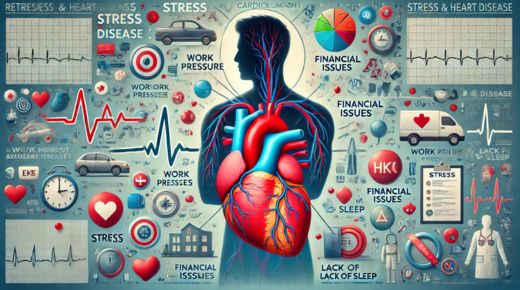
Stress affects the heart in many ways. It can cause high blood pressure, irregular heartbeats, and even heart attacks. Often, stress is linked to chest pain Port Saint Lucie residents experience. Understanding this connection is vital. By managing stress, heart disease risk can be reduced. This blog explores how stress impacts the heart and what can be done to protect it.
How Stress Impacts the Heart
When the body faces stress, it triggers a response. This response releases hormones like adrenaline. Such hormones increase heart rate and blood pressure. Over time, this can harm the heart. High blood pressure can lead to artery damage. Damaged arteries can result in heart disease. Stress also affects the blood flow to the heart. Reduced blood flow may cause chest pain.
Recognizing Stress-Induced Symptoms
Identifying stress-related heart symptoms is crucial. Knowing when stress affects the heart can prevent further issues. Some common signs include:
- Quick heartbeat
- Shortness of breath
- Chest pain
These symptoms might seem mild but should not be ignored. If they persist, seeking medical advice is important.
Stress and Heart Disease in Numbers
Research offers insights into how stress affects heart health. Below is a table showing the link between stress levels and heart disease risk:
| Stress Level | Heart Disease Risk |
| Low | 10% |
| Moderate | 30% |
| High | 50% |
Data shows that higher stress levels increase the risk of heart disease. Managing stress effectively can lower these risks.
Strategies to Manage Stress
Reducing stress is essential for heart health. Here are three simple strategies:
- Exercise Regularly: Physical activity reduces stress. It releases endorphins, improving mood.
- Practice Relaxation: Techniques like deep breathing or meditation calm the mind. They also lower blood pressure.
- Maintain Social Connections: Spending time with loved ones can provide emotional support. It helps manage stress better.
Incorporating these habits into daily life can make a big difference.
Professional Help and Resources
Sometimes, professional help is necessary. Therapy or counseling can aid in managing stress. Health professionals offer guidance and support.
Many resources are available for those seeking help. The Centers for Disease Control and Prevention provides information on heart disease and stress. The National Heart, Lung, and Blood Institute also offers resources on heart health.
Conclusion
Stress is a part of life but controlling it is key. By understanding the link between stress and heart disease, steps can be taken to protect heart health. Whether through personal strategies or professional help, managing stress is crucial. It not only improves quality of life but also reduces the risk of heart issues. Taking action today can lead to a healthier tomorrow.












